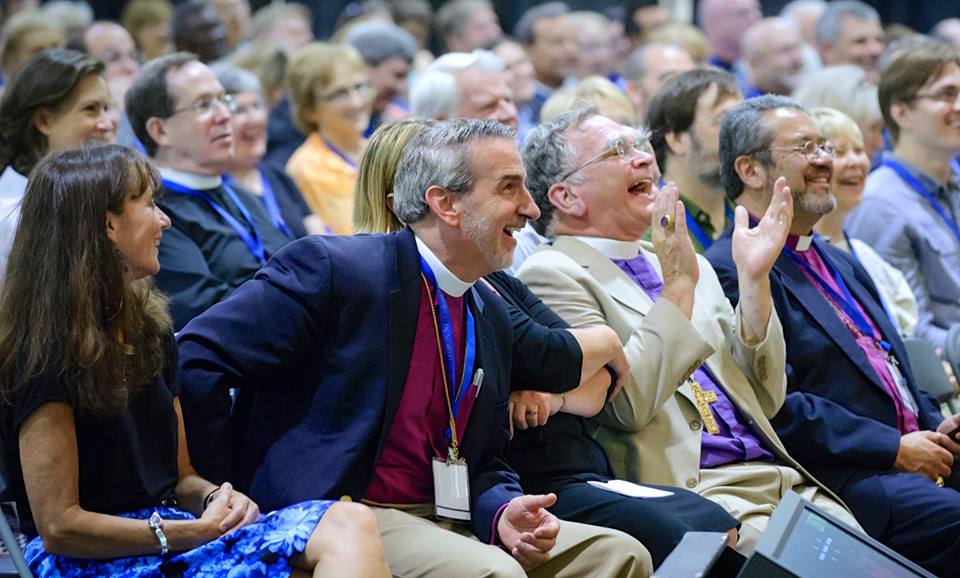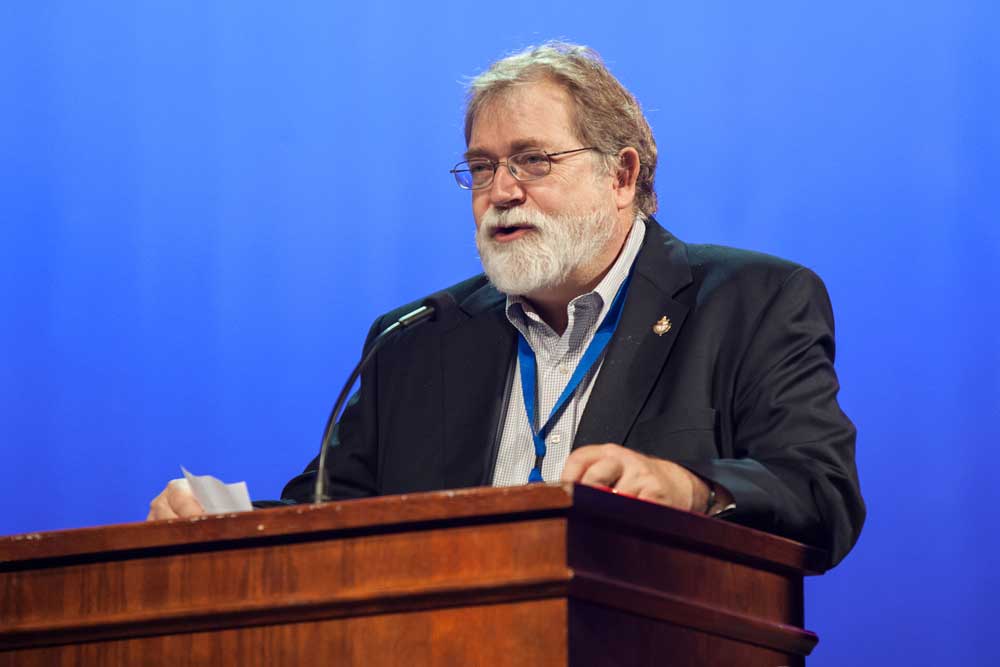Dear Brothers and Sisters in Christ, friends of the Anglican realignment,
Much has already been written about the meetings of the Anglican Church in North America (ACNA) last week—especially about the Bishop’s conclave, the election of +Foley Beach as our new Archbishop, the unity of all those gathered at Provincial Assembly and the great celebration of a race “well run” (2 Timothy 4:7) by Archbishop (emeritus) Robert Duncan. The election of +Foley Beach shows that the ACNA will live and flourish beyond the doomsayers who said we’d never make it this far. The addition of 12,000 new members, 488 new church plants, and several thousand adult baptisms shows that we are a church looking forward into mission and being true to our God given mission received through ++Robert Duncan—to Reach North America with the transforming love of Jesus Christ.
So let me offer just three observations, from my standpoint:
1. Together, we have changed the conversation: No, we did not plant 1000 churches in five years (2009-2014).But we planted 488 more than we would have if we had kept looking in the rear view mirror at our past and our exodus. And those 488 new churches are in addition to somewhere around 100 plants that did not succeed. Church planting experts like Ed Stetzer of Lifeway Ministries told us at Assembly that this accomplishment is extraordinary by any measurement, and that what we need to be thinking about is how to build on this momentum in the next five years. We are no longer defined by what we are NOT—we are defined by the Great Commission and the imperative of reaching people who do not yet know Jesus Christ. This is perhaps the greatest legacy Archbishop Duncan leaves us—changing the conversation from conflict with The Episcopal Church (TEC) to Christ’s Great Commission—and we are all much better for it spiritually, emotionally, and institutionally. Archbishop Foley’s sermon calling us to personal, relational evangelism, witness and discipleship in the workplace and beyond builds on that legacy with crystal clarity. Here at the American Anglican Council, we stand ready to promote this vision and mission of the ACNA as we continue to develop faithful leaders at all levels of the Church and equip local congregations to fulfill Christ’s Great Commission to make disciples.

2. We face a great, missional question: Like a bright red thread, it ran through virtually every speaker and every workshop—from Eric Metaxas (bestselling author of the biographies on Wilberforce and Bonhoeffer), to Christopher West (addressing John Paul II’s “Theology of the body”) to Archbishop Ben and Gloria Kwashi (on witnessing to Christ and his sacrificial love in the midst of grievous persecution) to Dr. J.I. Packer (the need for continual catechesis of every member in the local church)… How do we present the unchanging Gospel of Jesus Christ to an ever changing world? In fact, this is not a new question. This question is at the heart of the struggle for the soul of Anglicanism, as former Archbishops Drexel Gomez (West Indies) and Maurice Sinclair (Southern Cone) wrote back in 2001 while the Anglican Communion was beginning to unravel:
“How, in the midst of the pressures of time, do the Churches [of the Anglican Communion] both remain faithful to the teaching and practice of the Apostles and yet witness relevantly and in context to the truth of the Gospel among these changes and chances of history?” To Mend the Net (Ekklesia, 2001)
The next five years (and beyond) will require an ever deeper and more prayerful soul searching on what we need to change about ourselves and our churches that is not essential to the unchanging Gospel of Jesus Christ—especially if those things stand in the way of reaching people who do not yet know Jesus Christ and his transforming love. I was reminded of this personally and poignantly when called away Friday evening to perform a funeral for a member of my extended family. I was reminded again in that cauldron of grief within every family that loses a loved one- especially a parent- that there are many who do not yet know Christ or the hope of the Resurrection. It’s not that they are opposed to Jesus Christ—but there are many who are quite hostile to the church and “organized religion.” While opportunities abound to share Christ and his love, especially in times like this, we won’t be given the opportunity until people know that we personally care about them. I’m convicted afresh by my need as a follower of Christ to simply love others, listen, reach out and build relationships, trusting God for the timing to share Christ. How about you? How about the ACNA? “Building trust” is one key to sharing Christ in our ever changing culture. We have a long way to go to overcome mistrust and misinformation about Christianity. It will require missional creativity and personal, relational outreach on a scale that neither we nor are churches have known up to this point. But it will require even more… which brings up my final observation:
2. We need a new Pentecost: We need a fresh outpouring and enabling of the Holy Spirit that will enable us to become the kind of missional church where courage, compassion and conversion are the inevitable outcomes (Acts 2:42-47). We need grace. We need the power of the Holy Spirit beyond ourselves to make the necessary changes, personally and institutionally, to reach people with the love of Jesus Christ. As a canon lawyer, I find myself wanting to make sure that we honor our Anglican polity (i.e. the way Anglicans traditionally do things—and by the way there is a comprehensiveness to this all across the globe!) But structures must serve mission. I am reminded of something I shared in presentations for approval of changes to our ACNA constitution and canons. It was a quote by Charles Hummell from a book he wrote about the charismatic renewal in the 1990’s—Fire in the Fireplace (Downers Grove: IVP). In his book, he made the point that the church needs both the fireplace (structure and order) and the fire (the outpouring of the Holy Spirit on every believer and church). Without the fireplace, the fire can rage out of control. We Anglicans are great at the fireplace stuff—the stuff of constitution, canons, ecclesial structures, etc. But, as Hummell also notes, without the fire the fireplace is simply a collection of bricks or stones that are cold and dead.
We need both the fireplace and the fire in the next five years. Yes, we need to address things like overlapping jurisdictions and redundant structures that keep us from working together to fulfill Christ’s Great Commission.
But oh how we need the fire! So come Holy Spirit come…Come as the wind that blows, come as the fire that refines, come as the dew that refreshes. Convict, convert and consecrate us until we are wholly yours, and wholly committed to reaching people with the transforming love of Jesus Christ.
Yours in Him,
Phil+


